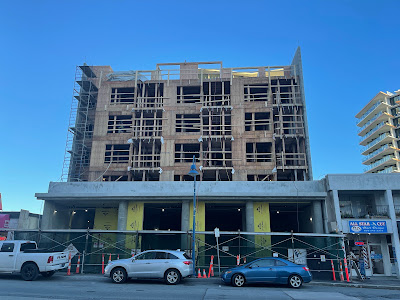Today, I’ll be continuing my post about Metro Vancouver Regional District’s proposed updated regional growth strategy, “Metro 2050.” Please read part 1.
While the comments the regional district has received from member municipalities and other stakeholders have been mainly supportive, there are some areas of concern.
Each successive regional growth strategy has become more prescriptive to ensure the success of regional goals.
The Livable Region Strategic Plan from the 90s was big on vision but light on how member municipalities could achieve that vision.
Metro 2050 prescriptiveness ensures that the regional district can meet our shared goals.
For example, to help achieve the goal of focusing growth in existing urban areas, the draft regional growth strategy states that member municipalities must “reduce residential and commercial parking requirements in Urban Centres and Frequent Transit Development Areas and consider the use of parking maximums.”
Sometimes, this prescriptiveness is unhelpful. For example, regional district staff proposed a complex hierarchy of Frequent Transit Development Areas. Several member municipalities and stakeholders, including Langley City Council, thought it was confusing and didn’t seem to help further regional goals.
Other areas of concern include:
- The regional affordable housing target of 15% target being not enough or too much
- Enabling limited residential uses on Employment Lands (Office Parks/Industrial Areas) that are within 200m of rapid transit stations
As a result, Metro Vancouver staff will remove the Frequent Transit Development Area Sub-Types section and update wording around affordable housing targets, clarifying that it is a region-wide, not a municipal target, from Metro 2050.
For residential uses on Employment Lands, Metro Vancouver staff are updating the draft of Metro 2050 to limit it to accessory caretaker units or allowing residential uses located only on the upper floors of buildings with commercial and light industrial on the ground floor within 200 metres of a rapid transit station.
Metro 2050 will contain additional content related to Indigenous perspectives and priorities.
Other proposed changes to the draft of Metro 2050 are either minor or technical. In the January 14, 2022 Metro Vancouver Regional Regional Planning Committee Agenda, you can read more.
Of interest is that Surrey Council did not submit any feedback about Metro 2050 and requested that regional district staff “schedule a workshop with Surrey Council to provide an opportunity to review and ask questions regarding the draft Regional Growth Strategy.”
Hopefully, it will be a productive workshop. Metro Vancouver staff are also working with the District of North Vancouver and Coquitlam to work through their concerns.
As I noted yesterday, all member municpalities and treaty First Nation must approve the regional growth strategy. If Surrey, the District of North Vancouver, or Coquitlam Councils do not support Metro 2050, it will not move forward.


No comments:
Post a Comment